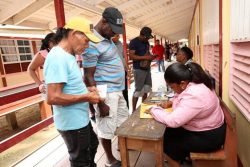A recently concluded mid-term review of the work of the Small Business Bureau has identified “challenges and gaps” in the agency’s operations though the Bureau’s Chief Executive Officer Dr. Lowell Porter has told Stabroek Business that “many good things…came out of the SBB that were never acknowledged.”
Up until and subsequent to Dr. Porter’s appointment to head the Bureau it had come under considerable criticism over the failure to make public its accomplishments in financing small business growth since its launch with much aplomb under the Donald Ramotar administration in 2013.
But Dr. Porter who holds a Masters Degree in Administration and a Phd. in Agricultural Science related a stream of accomplishments realized by the Bureau including the fact that 2,643 persons had benefitted from training provided by the Bureau up to June this year. Porter said that of the 660 persons targeted for training in 2017, 605 have received training across the 10 regions. He said that the training which the Bureau had provided included both “generic business management fundamentals as well as hands-on technical skills programmes along with life skills.”

Porter told Stabroek Business that in the course of his evaluation of the outcomes of the training provided by the Bureau he was able to identify both effectiveness and challenges. “I know for a fact that the way training is designed and delivered can greatly influence its effectiveness. For 2018, the plan is to focus on articulating the training priorities with our training partners and to ensure that there is clear alignment between the training goals and business objectives.
Also, take a look at organizational readiness for training. This involves identifying and removing or at least minimizing obstacles that might make the training less effective.”
The Bureau has previously come under public scrutiny linked to concerns over its administration of the allocation of training contracts with one source telling this newspaper that some individuals and institutions were being favoured with contracts, the anticipated deliverables from which might have been outside their areas of competence.
Porter told Stabroek Business that training apart the Bureau had exposed an Essequibo-based juice producer to a packaging expo in the United States, a Cosmetologist to a Hair Loss Management Programme in Trinidad and Tobago and a Pet Groomer to a Pet Grooming Expo and Workshop in the USA. He said that the three had been chosen on the basis of their “high growth potential.”
Meanwhile, according to Dr. Porter twenty of the Bureau’s clients had been offered the opportunity to showcase their products and services at the Giftland Mall during the Mall’s second anniversary celebrations earlier this year. Reports form the Bureau’s clients, Dr. Porter told Stabroek Business, suggested that their sales “exceeded expectations.” He said that the highlight of the exposure afforded by the Giftland Mall “was that some of those clients were selected by the Giftland Management to discuss the possibility of them selling their products in their soon to be opened Food Max Supermarket.
Meanwhile, Porter told Stabroek Business that he believed that there were no “constraints” only “challenges” to the effective execution of the Bureau’s mandate. “In fact I think many good things have been done by the SBB since 2014 for a relatively young organization. Lessons have been learned, resources have been gradually added, and strategies are being developed and implemented,” Porter said. He alluded to the implementation of the Bureau’s In-School Entrepreneurship Programme involving fifteen secondary schools and arising out of which 100 students will each benefit from a $30,000 grant. According to Porter the Bureau had already visited the schools in the various regions “to explain the programme and to provide business plan templates.”
A Youth Entrepreneurship Programme implemented with the support of the Ministry of Education and targeting youths from at-risk communities in Georgetown and Berbice has already seen the disbursement of seventy of the seventy-two grants approved for youths involved with the programme. Supplementary support is being offered through work attachments with private sector entities to enable the participants to benefit from “hands on technical and management skills.” A total of $14.82M was spent on this programme.








